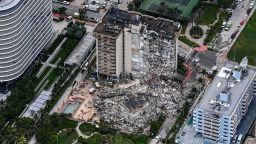In a new report, a Miami-Dade grand jury overseeing the Surfside condo collapse offered a litany of recommendations to help avoid a similar event, including, most notably, that the county’s 40-year recertification requirement be drastically changed.
In its 43-page report, the panel recommended that the certification process should begin much earlier than 40 years after a residential property is built. It said the initial certification inspection should be performed between 10 and 15 years after construction is complete, with updated reports every 10 years after that.
“Almost every expert and industry representative who testified to our grand jury opined that they thought 40 years was entirely too long to wait for a safety inspection which would determine the structural, electrical and life safety of buildings and residents in our communities,” the report said.
Ninety-eight people died when a portion of the Champlain Towers South building in South Florida collapsed in the middle of the night on June 24, as many residents slept. The victims ranged from 1 to 92 years old.
The engineering firm that was hired for the building’s 40-year recertification in 2018 had found “deep” concrete deterioration near the pool by that time but could not perform repairs, in part, because of concerns about stability, CNN previously reported.
State Attorney Katherine Fernandez Rundle announced after the collapse that she asked a grand jury to look into how to prevent another “such a disaster from occurring again, not just in Surfside, and not just in condominiums, but in all buildings and structures in the coastal, intercoastal and surrounding areas of our county, state and nation.”
“Steps could have and should have been taken in a timely manner to ensure the structural integrity of the building,” Rundle said in a statement on Wednesday.
In its report, the grand jury pointed out that months later, “we still do not know the cause of the collapse,” noting that the National Institute of Standards and Technology (NIST) continues to investigate.
The grand jury was not tasked with finding out why the building partially collapsed. It focused on “the policies, procedures, protocols, systems and practices of many of the participants involved in making sure that buildings in our communities are designed and constructed in a safe manner, that residents of those buildings effectuate timely and appropriate maintenance of their buildings so that they remain safe and habitable, and officers and officials exercise appropriate oversight to ensure all of the above.”
“Unfortunately, as to Champlain Towers South there were failings at every level and for all of the participants,” the report said.
In a news release regarding the report, Rundle said there were four “very serious lessons” learned following the collapse.
First, the state statute overseeing condominiums “needs serious revision.” Second, state and local governments need to focus on preventing dangerous structural deterioration. Next, the state’s condo boards must recognize the responsibilities they have when it comes to preserving the lives of buildings and their residents. And fourth, the state’s department supervising condo associations should be “seriously restructured so that it may finally play a seriously constructive role in overseeing condominium governance,” the news release said.
The grand jury’s report also noted that the city of Miami’s building department’s Unsafe Structures Division, to which buildings that don’t pass reinspection or are deemed unsafe are referred, is poorly staffed. Last year, the report said, the division had one inspector, one chief and four administrative personnel. That is “woefully insufficient,” the report said.
The report calls for more money, staff and inspectors to identify dangerous buildings. The grand jury also recommended raising qualification standards for inspectors.
Additionally, it recommended a “duty to report” be imposed on engineers conducting inspections.
“Should an engineer or architect who conducts a building inspection determine that the building or structure is unsafe for continued occupancy, (whether structural integrity, electrical issue, fire safety, or any other life safety concern) the engineer or architect shall notify the Local Building Official within 24 hours of such finding,” the group suggested.
The grand jury also said condo boards should be required to post maintenance documents and inspection reports online. Anyone elected to those boards should undergo courses on the importance of maintenance, effective management of condo money, and resources to help them do the job, the report added.
Calling on the October 2018 inspection at the Champlain Towers, the grand jury said, “There was sufficient information, provided early enough to put everyone on notice of a major problem. However, sadly, none of the participants acted quickly enough to avert this tragedy.”








